- Home
- Lisa Gardner
The Next Accident Page 12
The Next Accident Read online
Page 12
The bend in question was deep and arching, forming a sixty-degree curve complete with dense brush, thick trees, and a single telephone pole. Off to one side there was a small unpainted cross. Recently decorated with plastic flowers, probably by Oliver Jenkins’s widow.
Rainie parked her car. She got out and for a long time, she simply stood there, feeling the wind on her face. The road was quiet, no other cars in sight. The trees rustled overhead, and in her current frame of mind, the sound reminded her of dry, clicking bones.
She had to walk seventy feet to the telephone pole. A long enough distance to stop a car, she thought, or at least start to brake. She put her hand on the telephone pole. Then she ran her fingers down the violent scar slashing into the wood. Splinters stood straight out, the raw wood of the wound still lighter than the weathered exterior. She pressed the shards of wood gently back into place, as if that would somehow make things right.
The wind rose. The trees rustled and for a moment, it was very easy to believe she’d just heard someone laugh.
Rainie’s heart was thumping loudly. She was suddenly keenly aware of how alone she was in this place. And just how thick the underbrush, and just how dark the depths of the wood.
Five in the morning, Mandy had hit this post. Five in the morning, the trees barely kissed by sun, and the wind still cool. Five in the morning, dark, isolated, and terribly, terribly deserted.
Rainie had to get back to her car. She got in the driver’s side and locked the doors with shaking hands. Her shoulders were hunched. She could feel her heart loud and insistent in her chest.
She sat there. She wondered how many times Quincy had come to this mournful place. And then she started to drive because she didn’t care what anyone said. Standing next to that telephone pole, she’d been certain she was not alone.
12
Pennsylvania Dutch Country
Bethie was having a marvelous time. The sun was bright, the sky was blue, the wind was cool against her neck. She loved the feel of the car beneath her hands. She loved the sound of Tristan’s voice as he regaled her with story after story. And she liked telling him her stories, of her mother, her daughter, even her ex-husband, Pierce, whom she now suspected had a girlfriend in Portland, Oregon.
Time rolled by as easily as the miles. They headed west at first, no location in mind, then, on a whim, shifted south and drove into southern Pennsylvania with its lush expanse of verdant fields and the beautiful old farmhouses. They spotted women walking down dusty roads wearing quaint white bonnets. They passed horse-drawn carriages. They saw a man in his stone barnyard, bent over a woodpile and raising a blunt ax.
Tristan told her the histories of the various Germanic religious groups who’d settled here. She nodded, inhaling the scent of fresh mowed hay and thinking this was the most alive she’d felt in years.
They came to a narrow, twisty road shooting off into the fields.
“Let’s take it!” Tristan declared. So she did.
The road turned to gravel, then dirt. It grew narrower and the crop grew taller. A mile later, sheafs of wheat flowed along the side of the bright red car like a golden river.
“Keep going,” Tristan urged her eagerly. So she did.
The tide of wheat broke. They emerged into the low grass of a riverbank and Bethie hit the brakes right before they hit the water. She laughed breathlessly. Tristan clambered out of the car.
“Get out,” he told her. So she did.
“Come on, we’re going to have our picnic,” he informed her. “Look, I also brought champagne.”
They drank champagne. They ate caviar. They devoured the rich old cheese. Bethie sat in the curve of his body, with her arm pressed against his right side and the scar she thought of so protectively. He brushed bread crumbs from her knee. Then he lowered her down into the sweet-smelling grass, and covered her mouth with his as his fingers found her breast.
Afterwards, she stroked his right side tenderly. Then they both got up and without speaking, got dressed.
“Isn’t it wonderful out here?” she murmured. “So peaceful and isolated. I wonder how many cars must whiz by on the highway without ever thinking of taking this turn. There’s probably not anyone around for miles. Think of it: it’s our own special little place.”
Tristan turned back toward her. In the aftermath of making love, his blue eyes seemed especially fierce.
“Let’s go for a walk,” he told her. So she did.
13
Virginia
Rainie was in trouble. She was thinking dangerous thoughts. And she was in the middle of doing a very dangerous thing. She wasn’t heading back to the Motel 6. Instead, she was driving to Quincy’s.
He would want a full report of her investigation, and she had news at this point, or maybe not really news, more of a feeling that she didn’t want to deliver by phone. He would want to analyze everything. That was his way. And she did not want to picture him sitting in the dark again, contemplating horrible things all alone like his daughter’s murder.
Then there were all the questions. Maybe Mary Olsen was simply a little batty, a high-strung gold-digger desperate for attention. Perhaps the torrent of phone calls to Quincy’s house were purely coincidence, a bunch of bored felons looking for sick entertainment. And maybe Mandy’s accident was still an accident, and everyone else was merely seizing the opportunity to mess with a reputable FBI agent’s mind.
Or maybe there was a mystery man. Maybe he’d helped Mandy get drunk that night, guessing from her past behavior where that would lead. And maybe he understood what Mandy’s subsequent death would do to Quincy. Leave him feeling off balance, distracted, alone. Leave him vulnerable as the real plan began to unfold, the real threat to emerge . . .
There had been a time when Rainie would have dismissed such a theory as outlandish. Too cold, too callous to be possible. But that was before what had happened in Bakersville last year. Now she had the same fundamental training Quincy did. She understood the worst men could do, and she no longer considered anything to be too cruel to happen. Most people thought murderers killed out of some sort of necessity. Those were the easy cases. Far worse were psychopaths who considered murder to be not only a hobby, but a recreational sport.
Quincy had been there for her once. She planned on returning the favor.
Rainie consulted her map again, blew by her turnoff, and after thirty-six hours of practice, executed a perfectly brilliant and highly illegal U-turn. She went down the desired street.
The road was wide here, boasting a gracefully curving sidewalk and tons of freshly planted magnolia trees. New neighborhood, she decided. New money. She turned into a cul-de-sac and tried to keep her eyes from popping out of her head. Huge brick colonials sat up on vast expanses of emerald lawn. Big houses. Big yards. Fenced-in properties and gated drives.
She had figured Quincy’s security-conscious nature would place him in some type of gated community, but she hadn’t planned on this. She followed the house numbers down to the end, where a smaller, more discreet brick house was tucked back from the road. Rainie knew it was Quincy’s without having to check the address; it was the only home where every single bush had been removed, eliminating places for the discriminating intruder to hide.
She looked at his denuded lot and sighed. “Quincy, Quincy, Quincy,” she murmured. “You have got to take a vacation.”
She pulled up to the black, wrought-iron gate and pushed the intercom button. It was only four P.M. and she really didn’t expect Quincy to be home, so she was surprised when someone answered her buzz. She was even more surprised that it was a woman’s voice.
“Name and business,” the woman asked evenly.
“Uhhhh, Lorraine Conner. I work with Quincy.” Not quite a lie.
“Please look into the camera and show your ID.”
Run now, Rainie thought, or forever hold your peace. Gamely, she stared into the mounted camera and flashed her PI’s license.
Moments later, the gate began
to rumble, then slide slowly back. Rainie drove up the sweeping drive to find the front door open and a woman standing there. Rainie got out of her car, feeling not nearly so good about things.
The woman in question was middle-aged. Probably forty, but maybe thirty—the severe hairstyle and stern gray suit didn’t do her any favors. She stood stiffly, her arms folded over her chest and her feet clad in sensible black shoes.
Didn’t look like a housekeeper, Rainie decided. Not Quincy’s type so she couldn’t be his ex-wife. On the other hand, she’d make one hell of a governess.
Shoulders back, head up, Rainie marched up to the entrance.
“Who are you?” she asked Dour Chic.
“The question is, who are you?”
“I already gave at the camera. Plus, I asked you first.”
Dour Chic smiled, but it came out as a grim line. “Maybe, honey, but my ID is bigger than yours.” Dour Chic flashed her creds. The FBI emblem did carry a bit more weight than Rainie’s puny PI’s license. Rainie scowled and tried to figure out what was going on.
“I’m here to see Quincy,” she said.
“Why?”
“That would be Quincy’s business, not yours.”
“At the moment, his business is my business.”
“Are you sleeping with him?”
Dour Chic blinked. “I believe you misunderstand the nature of my business—”
“So you’re not sleeping with him. Then my business and his business isn’t your business.”
Rainie let the female agent sort that out. She knew the instant the woman had arrived at the implied conclusion, because she blushed.
“I thought you said you were a private investigator,” Dour Chic said with a scowl.
“Yeah, well, I thought you might be his ex-wife,” Rainie lied. “Now, if you don’t mind, I’ve given my name and I’ve traded IDs, so where’s Quincy?”
The woman seemed to be debating with herself. “You might be able to find him at Quantico,” she allowed brusquely. “That’s all I’m at liberty to say.”
“You don’t expect him to come home tonight?”
“That’s all I’m at liberty to say.”
“Oh, I get it,” Rainie said. “The phone calls. You’re the cavalry.”
The agent didn’t answer right away. Then she gave a slow nod. Rainie nodded back. She looked at the woman with new interest, and what she saw now made her feel small and more than a bit bad. Not a stern suit, but a professional suit fashioned to hide a handgun. Not a severe hairstyle, but one suitable for running down master criminals. Not a dour face, but the intelligent face of a smart, successful woman. In short, a genuine, certified one hundred percent well-trained federal agent. And then there was Rainie, a freshly hatched PI who had been fired from the policing job she’d loved because she’d once been driven to kill.
This was Quincy’s world. And that quickly, Rainie was sorry that she’d intruded.
“Well, I’ll be going now,” she said.
“I’ll tell him you came.”
Rainie bit her lower lip. Of course the agent would tell him. That was her job, and Dour Chic obviously lived for her job.
“You do that. In the meantime, I’ll try him at his office—”
“Quantico.”
“Yeah, Quantico—”
“It’s a Marine base.”
“I know it’s a Marine base!”
Dour Chic formed another thin-lipped smile. She was giving Rainie a fresh perusal as well, and her first impression was clearly sliding downhill.
Fuck it. Rainie didn’t bother with good-bye. She turned around, climbed back into her car and tried not to let the gate hit her ass on the way out.
“Goddamn know-it-all,” she muttered a moment later, but she was driving too fast. She was thinking again of nights much too long ago to change. And she was thinking again that admitting to your past still didn’t allow you to escape it. Some people grew up to be federal agents. And other people?
“Fuck it,” she said again.
Rainie should’ve quit while she was ahead. She found the turnoff to Quantico, then drove for fifteen minutes through a heavily wooded road where Marines jogged in formation along the edge of the blacktop and the air was repeatedly split by the crack of gunfire. She passed a number of indistinguishable buildings, heading deeper into the Marine base and feeling more and more like an interloper at Uncle Sam’s private club. No one stopped her. No one asked for ID. She wasn’t sure whether to be grateful or worried.
She had just started to relax when the Marine base ended, and a guard post abruptly loomed ahead. Apparently, someone had decided that the Marines could take care of themselves. The FBI Academy, however, required a great deal of protection. She halted at the guard post, where a stony-faced security officer took her name, studied her PI’s license and told her she was not permitted to enter. She gave her name again. She flashed her ID. He told her that she was not permitted to enter.
“Look, I’m an associate of SupSpAg—er, Supervisory Special Agent Pierce Quincy,” she tried.
The grim guard was not impressed.
“I don’t need full access or anything,” she attempted next. “Don’t you guys offer a visitor’s pass?”
She learned she could indeed be a visitor. If her name had been given to him ahead of time. With appropriate clearance.
“So what the hell do I do now? Wait, wait,” she held up a hand upon seeing the firm expression on his chiseled face. “I remember: I am not permitted to enter.”
After a little more wrangling, she finally agreed to wait in her car under the officer’s tight scrutiny. In turn, he agreed to contact the BSU office and inquire if Supervisory Special Agent Pierce Quincy would like to come out and see a guest.
Fifteen minutes later, Quincy’s car appeared. He looked tired, stressed, and not at all happy to see her. So much for the reunion scene where they ran to each other with open arms. Instead, she meekly followed his car off the Marine base into the nearby little town where he pulled into the parking lot of a restaurant.
“I want some coffee,” he said as he climbed out of his car.
“Hello to you, too,” she replied.
“You crash government facilities often?”
“I didn’t realize it would be so hard.”
“Rainie, it’s the FBI Academy. We have procedures and protocol. If just anyone could walk in, it would ruin the point.”
“Fine. Next time I’ll wear my best cocktail dress.”
“Christ,” he said. “You really can be childish.”
He headed for the restaurant. She stood rooted in the parking lot, stunned by the coldness in his voice. Then the shock wore off, and she went after him.
“What the hell is with you?” Rainie demanded, catching up with Quincy as he approached the cashier and grabbing his arm.
“Two coffees,” he ordered. “One black, one with way too much cream and sugar.”
“I don’t need coffee. I want an explanation.”
“Coffee’s easier,” he told her, and wouldn’t say another word until the amused cashier delivered both cups. Then he made Rainie follow him back outside, to a picnic table in a grove of trees she hadn’t noticed before. The walk was long and didn’t do a thing to calm her temper.
“Okay,” she announced the instant he sat at the table. “What the hell is going on, Quincy? And you’d better start talking or you’ll be wearing this coffee with ‘way too much cream and sugar.’”
Quincy blew on his black, steaming brew. She could see now that the shadows had deepened under his eyes and his cheeks had gained the hollowed look of a man not sleeping at night. It was funny, she thought. Last year, she had been the one looking like walking death, and Quincy had been the one lecturing her to eat and sleep anyway. Stress is an even better reason to take care of yourself, he’d told her. Taking care of the body helps take care of the mind. If she repeated his own lecture back to him now, she wondered, how childish would that be?
&
nbsp; “Have you heard of something called identity theft?” Quincy asked tersely.
Rainie sat down. She sipped her coffee. She nodded.
“A person steals someone’s identity. Not too hard to do in this day and age. Gets the person’s Social Security number and mother’s maiden name, then uses that information to get a copy of the birth certificate and voilà, becomes the new person. It’s amazing all the things you can do once you have basic documentation. Get a valid driver’s license. Open a bank account or apply for a credit card. Buy a car, a red Audi TT roadster, I take it, registered and financed in the unwitting victim’s name.”
“Someone used your name to buy a sports car?”
“In New York. Two weeks ago. In theory, I currently owe a Westchester dealership forty thousand dollars, payable in convenient monthly installments of eight hundred and eleven dollars over the next five years.”
“Someone stole an FBI agent’s identity?”
“Why not? He’s already given out my personal information to half the hardened criminals in the country. After that, what’s one high-performance vehicle?” Quincy paused. He added grudgingly, “At least the man has good taste.”
Rainie still couldn’t believe it. “Identity theft . . . Doesn’t the Bureau have specialists in this area?”
“The Bureau has specialists in every area,” Quincy told her, but didn’t sound encouraged. He set down his coffee cup, and Rainie was shocked to see that his hands were shaking.
“They took over my house, Rainie,” he said quietly. “This afternoon fellow agents set up cameras on my daughter’s grave. It’s ironic. I’m an expert. In fact, I’m an expert in precisely these kinds of cases, and as of seven oh-five this morning, no one cares about my opinion anymore. As of seven oh-five this morning, I became a victim, and I have never hated anything more.”
“They’re idiots, Quince. I’ve told you that before. If FBI agents were so smart, they wouldn’t still be running around in such god-awful suits after the rest of the world has gone business casual. What kind of man starts his day by tying a noose around his neck anyway?”

 Find Her
Find Her Before She Disappeared
Before She Disappeared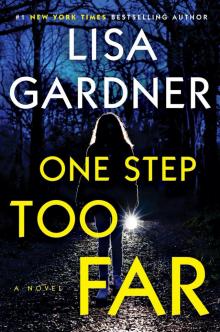 One Step Too Far
One Step Too Far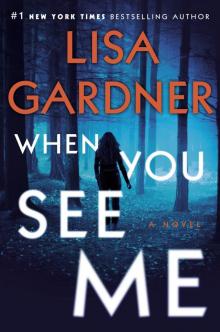 When You See Me
When You See Me Never Tell
Never Tell Touch & Go
Touch & Go The Survivors Club
The Survivors Club MacNamara's Woman
MacNamara's Woman Love You More: A Novel
Love You More: A Novel Gone
Gone The Perfect Husband
The Perfect Husband Maggie's Man: A Family Secrets
Maggie's Man: A Family Secrets The 7th Month
The 7th Month The Neighbor
The Neighbor Hide
Hide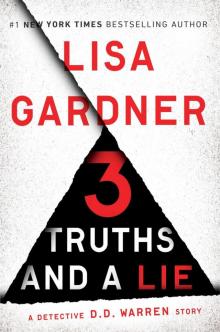 3 Truths and a Lie
3 Truths and a Lie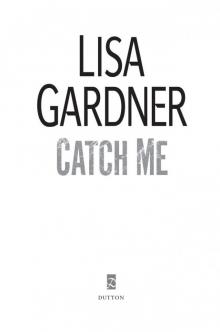 Catch Me
Catch Me Fear Nothing: A Detective
Fear Nothing: A Detective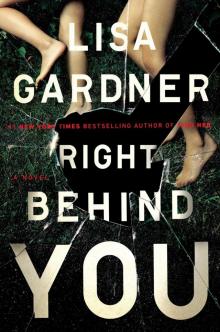 Right Behind You
Right Behind You The Guy Who Died Twice
The Guy Who Died Twice Live to Tell: A Detective D.D. Warren Novel
Live to Tell: A Detective D.D. Warren Novel Live to Tell
Live to Tell Maggie's Man: A Family Secrets Novel
Maggie's Man: A Family Secrets Novel The Other Daughter
The Other Daughter Alone
Alone Crash & Burn
Crash & Burn The Detective D. D. Warren Series 5-Book Bundle
The Detective D. D. Warren Series 5-Book Bundle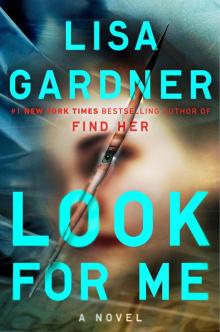 Look for Me
Look for Me Love You More
Love You More The FBI Profiler Series 6-Book Bundle
The FBI Profiler Series 6-Book Bundle The Third Victim (Quincy / Rainie)
The Third Victim (Quincy / Rainie) Say Goodbye
Say Goodbye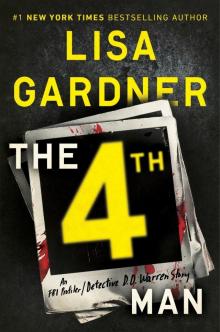 The 4th Man
The 4th Man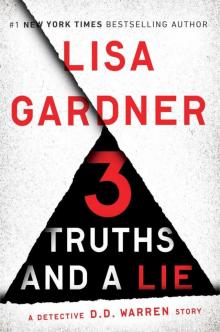 3 Truths and a Lie: A Detective D. D. Warren Story (Kindle Single)
3 Truths and a Lie: A Detective D. D. Warren Story (Kindle Single) Brandon's Bride
Brandon's Bride